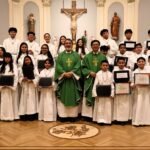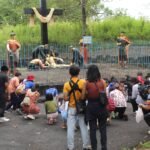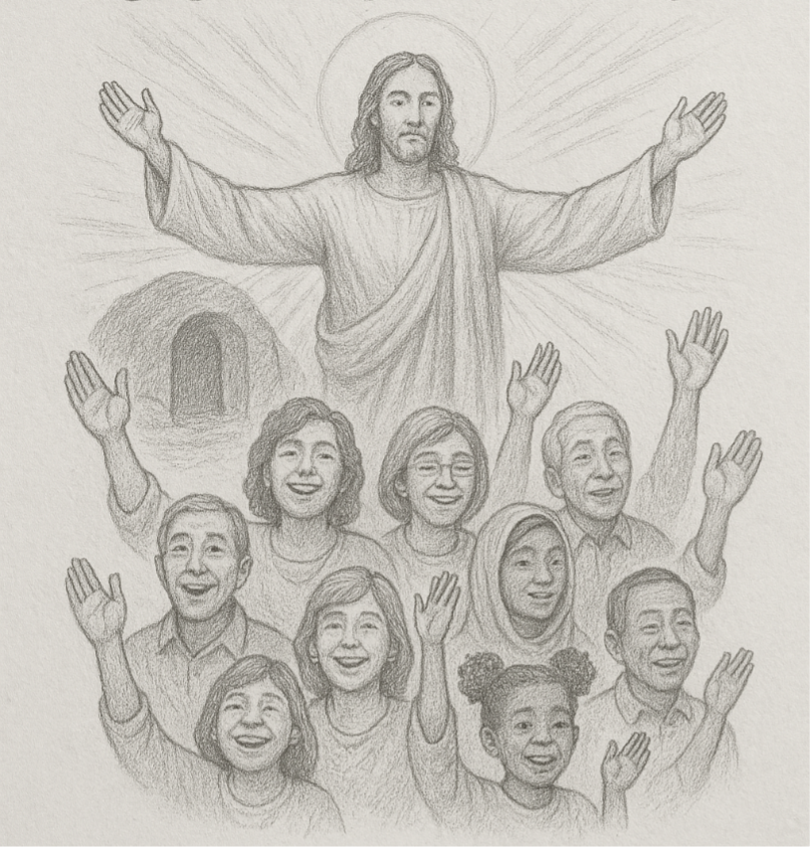
On the afternoon of Wednesday, June 26, the St. John Paul II auditorium in the Basilica of the Conception of Our Lady, hosted the presentation of the book In the Image of the Trinity. To understand the “mutuae relationes”. Ecclesiology of communion and consecrated life, in an act organized by the Fernando Rielo Foundation and the Library of Christian Authors.
The author, Lourdes Grosso García, idente missionary, is Director of the Secretariat of the Episcopal Commission for Consecrated Life of the Spanish Episcopal Conference; Consultant of the Congregation for Institutes of Consecrated Life and Societies of Apostolic Life; and Coordinator of the Chair of Theology of Consecrated Life at the Ecclesiastical University of San Dámaso.
The ceremony was presided over by Monsignor Vicente Jiménez Zamora, Archbishop of Zaragoza and member of the Congregation for Institutes of Consecrated Life and Societies of Apostolic Life, who in his words underlined that this work “arrives very opportunely, at a time when, on the orders of the Holy Father Francis, the Congregation for Institutes of Consecrated Life and Societies of Apostolic Life and the Congregation for Bishops are working on a new elaboration of Mutuae relationes. I have the undeserved honor of being part of the Writing Commission for the new Directory of Mutuae Relationes in Ecclesia.
The pages of Dr. Lourdes Grosso’s book wish to prepare the reception of the new document, following an argued and systematic itinerary in which elements of a philosophical, anthropological, ecclesiological and charismatic nature are dealt with. With this in mind, the author, an idente missionary, turns to the contribution of the founder of the Institute, Fernando Rielo, exposing from his metaphysical model (the genetic conception of the principle of relationship or genetic model), the repercussions that a profoundly believer´s thought has on life and ecclesial communion.
For his part, D. Jesús Pulido Arriero, who that same morning the Standing Committee of the Spanish Episcopal Conference had appointed new director general of the Library of Christian Authors (BAC), wanted to point out that “this publication and today’s presentation are part of a jubilee year for the BAC. The Christian Authors’ Library will be 75 years old in 2019. This seventy-fifth anniversary of its foundation is also joined by the thirtieth anniversary in the hands of the Spanish Bishops, since, since 1989, the BAC belongs to and is the editorial seal of the Spanish Episcopal Conference”.
“It is not the subjects, but the authors who identify the BAC as its name indicates, the Library of Christian Authors,” continued the director. Reading its catalogue sometimes gives the impression of reciting a complete litany of holy fathers and doctors of the Church, founders and masters of spirituality, Popes, theologians and authors, contemporary writers of recognized prestige… It’s the BAC authors”. Dr. Lourdes Grosso was already clearly an author of the BAC, she was already part of this litany, with “Rabboni” Presence and Mission of Women in the Church” (2016) and now also with “In the Image of the Trinity”.
In harmony with the Holy Father, Dr. Lourdes Grosso addresses “one of the most characteristic notes of her ecclesiology which is undoubtedly the importance she attaches to the synodal condition of the Church”, and “insists that the mutual relations between bishops and consecrated persons cannot have any other frame of reference than Trinitarian communion”.
Dr. Juana Sánchez-Gey Venegas, director of the Aula of Thought of the Fernando Rielo Foundation and vice-president of the Association of Philosophical Hispanism, contextualized the thought of Fernando Rielo in his time, stressing that the twentieth century gave an anthropological turn to philosophy, because man seeks the meaning of his existence beyond reductionism; this is the framework for Fernando Rielo’s mystical conception of anthropology, which focuses on man and his relationship with the Absolute.
The book welcomes the concern of the Pontiffs in noting that in the face of the Christian metaphysical tradition “the man of our time, rich in means but not equally rich in ends, often lives conditioned by a reductionism and a relativism which lead to the loss of the meaning of things […]. Against this background, thought is weak and ethical impoverishment is gaining ground, obscuring normative references to value” (Benedict XVI, 3-5-2012). For this reason it is necessary “to recover, following a perennially valid philosophical tradition, the dimensions of authentic wisdom and truth, even metaphysical, of philosophical thought” (Fides et ratio 106). He is grateful to the author that, from her formation in the Idente School, she exposes in this work new ways for the Christian thought from the contribution of Fernando Rielo.
The last intervention was made by the author Lourdes Grosso García, who expressed that today there are many philosophical, anthropological and even ecclesiological positions that prevent relations that are based on participation in the Trinitarian communion. This work, in all modesty, proposes to present a philosophical foundation in harmony with the Word of God, and to present Trinitarian theology as the paradigm of all theological reflection and the nucleus of the ecclesiology of communion.
After briefly presenting the intra-history of this book, its objectives and the content of its three parts: Perspective, Doctrinal framework with its Status quaestionis and Areas for reflection, she explained that in the ecclesiology of communion two key concepts are currently underlined that respond to the action of the Holy Spirit in the life and mission of the Church: coessentiality and synodality, and he proposed a mystical conception of coessentiality, from the metaphysics of
Fernando Rielo.
The work ends with some operative consequences for the intraecclesial mutual relations and the invocation to Mary, Mother of the Church, and a brief Epilogue: “we can find many philosophical, anthropological, historical, ecclesiological reasons,… but the most important thing is that “the spirit of the Lord fills the earth” (Wis 1:7) and with him we can walk together on the way to holiness, as Pope Francis exhorts us in Gaudete et exsultate”.
Available from: http://bac-editorial.es/estudios-y-ensayos/1674-a-imagen-de-la-trinidad-para-comprender-las-mutuae-relationes-eclesiologia-de-comunion-y-vida-consagrada.html
Here is the link to the interventions of Mons. Vicente Jiménez and Lourdes Grosso.















